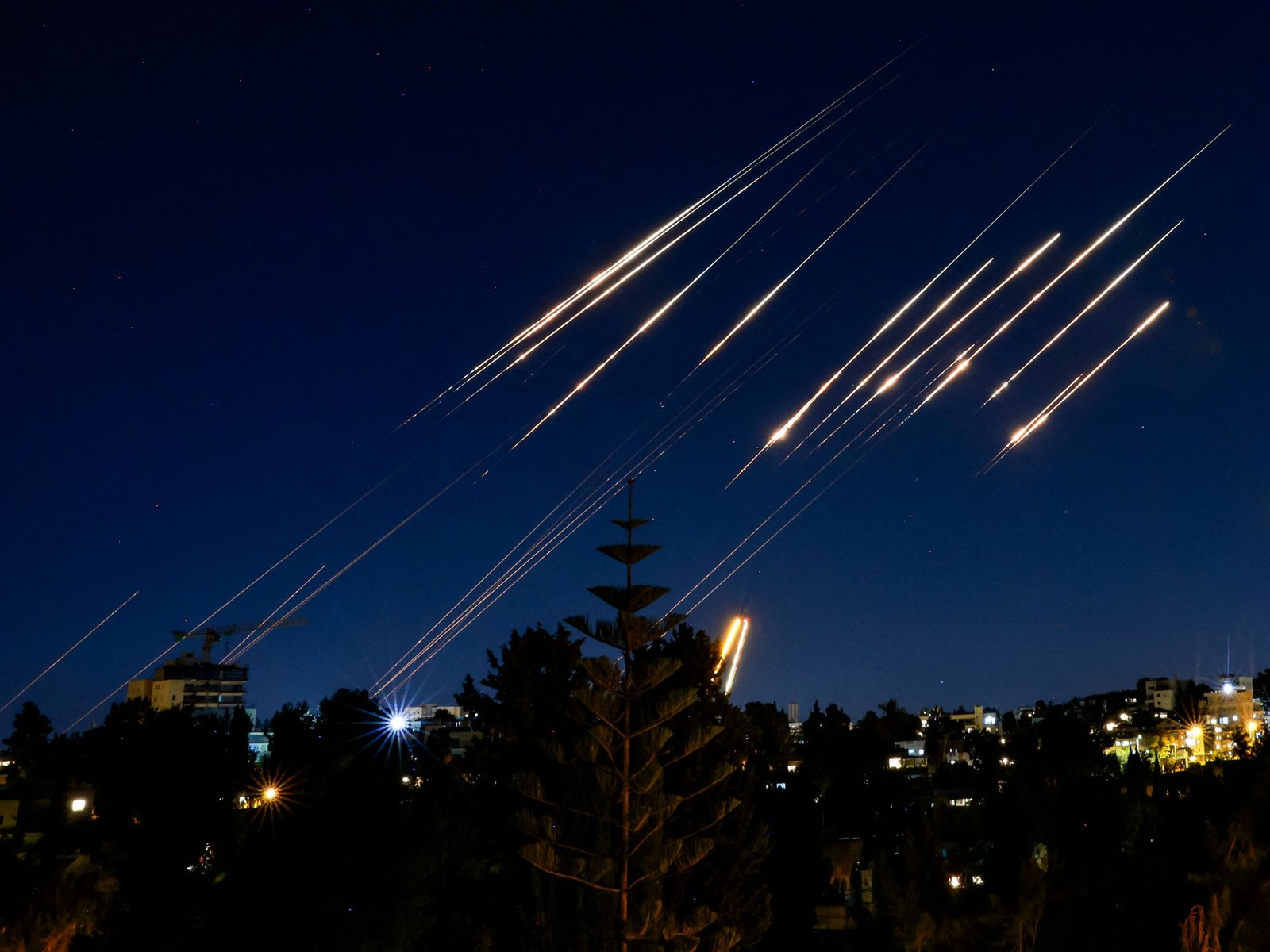According to Iran’s state news outlet IRNA, Iranian forces are conducting a multi-faceted assault utilizing drones and missiles targeting cities in Israel, resulting in audible explosions across Israeli urban areas.
Israel’s Channel 13 reported late Saturday on initial findings indicating that Iranian missiles struck the northern coastal city of Haifa, as well as the neighboring town of Tamra. Social media footage, later verified by Al Jazeera’s Sanad, captured images of Iranian cruise missiles soaring over northern Israel.
Meanwhile, the Israel Defense Forces announced they are retaliating by attacking military sites in Tehran, Iran’s capital.
Earlier that day, Iran accused Israel of escalating its military operations against them for the second consecutive day, targeting critical infrastructure and further straining an already fragile economy, raising concerns that the conflict may evolve into a prolonged all-out war.
Iranian authorities confirmed that an explosion occurred at the South Pars gas field—one of the country’s essential energy assets—after an Israeli strike. Reports indicate that gas production was interrupted, with state media stating that 12 million cubic meters (approximately 423 million cubic feet) from Phase 14 have been suspended. Although officials later announced the fire was extinguished, the full extent of the damage remains uncertain.
An Israeli source characterized the strike as a deliberate warning to Tehran, indicating a broader strategy aimed at debilitating Iran’s economic and military capabilities, as reported by Fox News. The Israeli Broadcasting Authority relayed comments from an official stating, “We targeted another Iranian gas field after Bushehr, and national infrastructure remains a priority.”
Energy analyst Manouchehr Takin remarked to Al Jazeera that targeting South Pars, vital for both domestic use and commerce, would exacerbate Iran’s internal energy crisis. “This is an attempt to incapacitate Iran’s economy,” Takin explained, noting that the domestic gas infrastructure was already under severe stress due to sanctions and mismanagement.
Al Jazeera’s Nour Odeh, reporting from Amman, highlighted a notable shift in Israeli strategy. “Previously, Israel focused on military assets, nuclear scientists, and missile facilities; now it’s targeting civilian economic resources,” she stated, cautioning that significant damage could have dire economic repercussions.
Iran Responds to Civilian Losses with Retaliation Threats
Tehran reported a tragic toll of at least 80 fatalities and over 320 injuries—including women and children—resulting from Israeli attacks on military and civilian infrastructure in the capital.
Among the deceased are allegedly nine nuclear scientists. In response, Iran launched a missile barrage that reportedly breached Israel’s advanced missile defense systems, leading to at least four deaths and over 200 injuries in Israel since Friday.
Iranian state media also claimed to have downed an Israeli F-35 fighter jet, regarded as one of the most sophisticated in Israel’s arsenal. However, despite several Iranian outlets corroborating the claim, no official evidence has been released, and Israeli officials have dismissed the reports as false.
Reporting from Tehran, Al Jazeera’s Tohid Asadi indicated rising public discontent. “Many Iranians are upset that civilian targets were struck,” he reported. “There had been hope during prior negotiations, but now, uncertainty and fear of escalation prevail.” This follows the cancellation of planned talks in Oman that were scheduled for Sunday.
U.S. President Donald Trump had linked diplomatic negotiations to Iran’s willingness to reduce its nuclear program. However, Iranian Foreign Minister Abbas Araghchi stated that dialogues are off the table while “barbarous” Israeli attacks persist.
In the meantime, the Israeli military claims to have targeted over 150 Iranian sites and warned that their campaign may extend for weeks. Defense Minister Israel Katz issued a stark caution: “If Khamenei continues to fire missiles at Israel, Tehran will face severe consequences.”
![Israeli search and rescue operation amid the rubble following Iranian missile attacks in Rishon LeZion, Israel, on June 14, 2025. [Mostafa Alkharouf/Anadolu Agency]](https://unilik.pro/wp-content/uploads/2025/06/Escalating-Tensions-Irans-New-Missile-and-Drone-Assault-on-Israel.jpeg)
Global Leaders Express Concern Amid Warnings of Escalation
The possibility of a full-scale regional conflict has prompted responses from global leaders, heightening international fears.
Iran hinted at potentially closing the Strait of Hormuz, a vital oil shipping route, should the conflict escalate further. Tehran also warned that any foreign military installations aiding Israel could become targets for retaliation.
However, Iran’s capacity for external retaliation appears diminished. After nearly two years of conflict in Gaza and last year’s hostilities in Lebanon, its primary regional allies—Hamas and Hezbollah—are notably weakened, limiting Iran’s military options.
Turkish President Recep Tayyip Erdogan conferred with both Saudi Crown Prince Mohammed bin Salman and Iranian President Masoud Pezeshkian, attributing the crisis to Israeli Prime Minister Benjamin Netanyahu. He warned that Israel represents a significant threat to stability in the region and called for an immediate cessation of hostilities. “The only path to resolve the nuclear contention is through dialogue,” Erdogan stated, cautioning of a looming refugee crisis should the situation worsen.
Erdogan further accused Israel of using its assaults on Iran as a distraction from what he described as a genocide occurring in Gaza, asserting, “Netanyahu aims to ignite the region and undermine diplomatic avenues.”
As international dialogues intensify, U.S. President Donald Trump and Russian President Vladimir Putin had a lengthy discussion on Saturday. While Trump commended Israel’s military actions and issued warnings to Iran, Putin expressed serious concerns and urged an end to the military operations. Both leaders, however, remained open to the possibility of resuming nuclear negotiations.
Chinese Foreign Minister Wang Yi engaged in communications with both Iranian and Israeli officials, reaffirming Beijing’s support for Tehran. He stated that China “stands with Iran in preserving its national sovereignty, defending its legitimate rights and interests, and ensuring the safety of its populace,” according to a statement from the foreign ministry.

